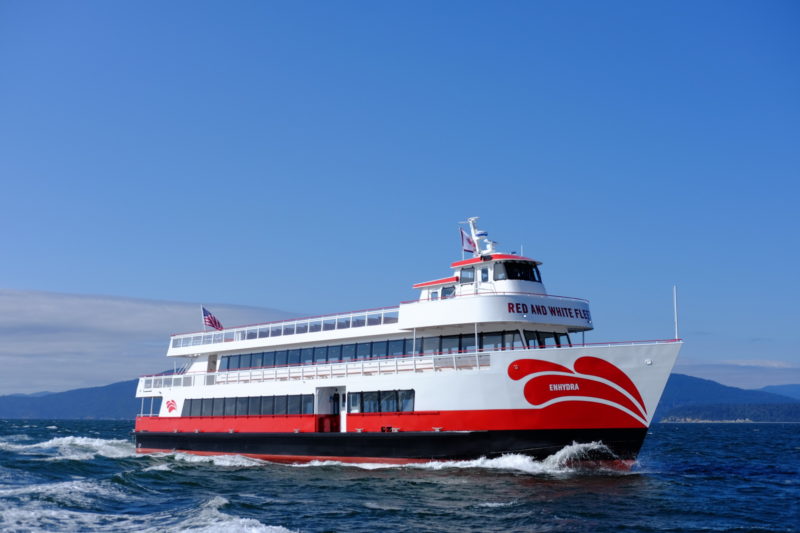Hybrid and electric powered vessels are still a small part of the workboat fleet. But last week’s International WorkBoat Show in New Orleans offered some insight into where next-generation propulsion systems are going.
The Enhydra, the new Red and White Fleet excursion vessel built for the San Francisco Bay operator by All American Marine, had pride of place at the show as WorkBoat’s 2018 Boat of the Year.
With its quiet, ultra-low emissions power profile, the Enhydra is at the cutting edge of moves to minimize the environmental impact of California’s commercial marine industry, by reducing air pollution emissions and the industry’s contribution to atmospheric carbon dioxide linked to climate change.
British Columbia and Washington state ferry operators are adding hybrid and battery power, and manufacturers are moving to meet demand.
“The hybrid technology is where everybody is trying to go,” said Adam Jost, applications manager with Thrustmaster, the Houston-based propulsion integrator whose show display was built around its latest electric pod thruster design. The company is offering “a complete turnkey solution for hybrid vessels,” and a big part of that market is ferry operators and state and local transportation agencies, said Jost.
Thrustmaster saw the market coming this way and has been making strategic moves over the past three years. One was bringing on board designer Paul Rembach as hybrid systems manager and the patents he developed with Legacy Automation.
An expert in energy management, Rembach says the technology now going into the first generation of hybrid workboats still has much to gain in efficiency and “greener” supply chains.
“Part of the cost of batteries is also when you finish using them,” said Rembach, so those financial and ecological costs should be factored in. While some components of dead batteries can be recycled, some 40% are incinerated or otherwise wasted, he said. By dividing a battery’s lifespan in three phases — mining, manufacture and transport, then working life, and in the end as waste — the actual costs can be calculated, he said.
“You’re always coming out with more than 100% carbon in the end,” Rembach added. Thrustmaster’s goal is to come up with solutions that are “economically feasible for our clients, and ecologically green,” he said.
Over at the American Bureau of Shipping booth, Domenic Carlucci explained what ABS is doing to assist clients making to move to hybrid power systems.
“We’re seeing a lot of ferry work,” said Carlucci, manager of machinery, electrical and controls, and advanced technology and research for ABS. On the workboat side, operators are interested in hybrid power for dynamic positioning, and energy storage that can add to bollard pull on tugboats and towing vessels.
Reducing emissions is another motivator. Hybrid power can be a solution for boosting horsepower without the expense and design challenges of going to bigger EPA Tier 4 diesels. On the West Coast, California air pollution regulators are looking for ways to tighten what are already the nation’s toughest air quality rules for working vessels.
“California makes everyone look to the future,” said Carlucci.
The maritime world’s biggest operators are looking there too. ABS experts have been working with containership operators who are looking for new technology in applications like ship generators, said Carlucci.
This week shipping giant Maersk says it wants more “carbon-neutral” power for its new containerships by 2030.
“The only possible way to achieve the so-much-needed decarbonization in our industry is by fully transforming to new carbon-neutral fuels and supply chains,” Soren Toft, chief operating officer at A.P. Moller-Maersk, said in a statement Tuesday.
“The next five to 10 years are going to be crucial. We will invest significant resources for innovation and fleet technology to improve the technical and financial viability of decarbonized solutions,” said Toft. “Over the last four years, we have invested around $1 billion and engaged 50-plus engineers each year in developing and deploying energy-efficient solutions. Going forward we cannot do this alone.”





